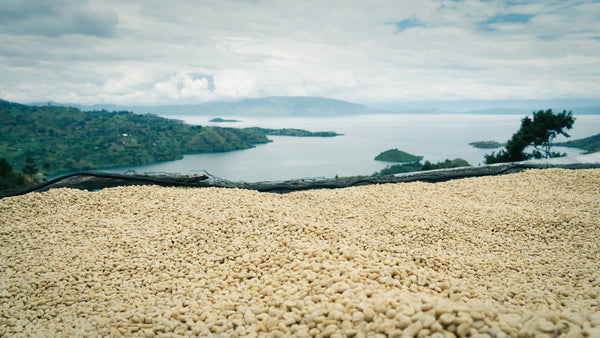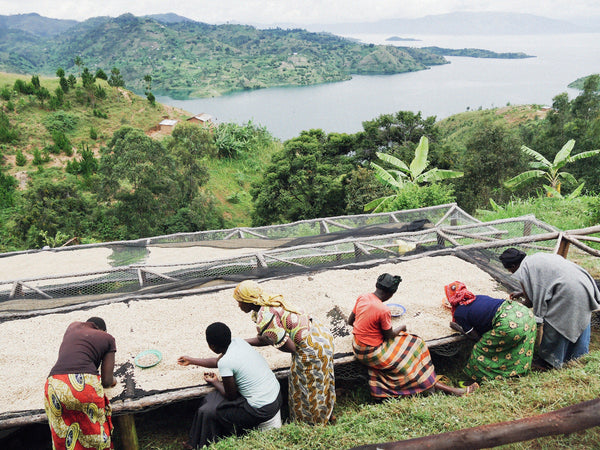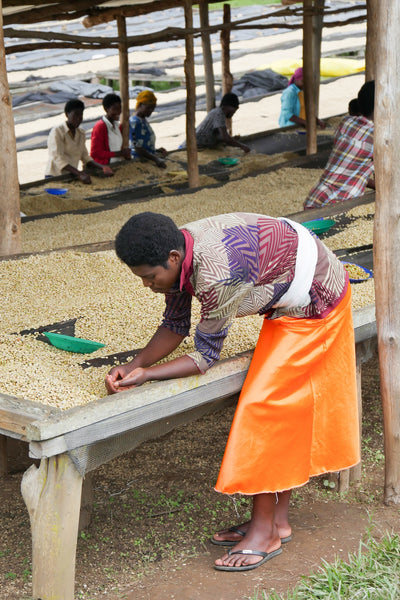
This year we bought a large percentage of our coffee from Rwanda via several businesses who have links to the speciality industry in Africa. I decided it was time to go there and meet some of the people involved all the way down to the farm level. It also gave me a great opportunity to develop a some direct trade relationships out there and to setup our first direct trade program. As a result of this trip we will be bringing in even more coffee from Rwanda this year and plan to visit every year and participate in community development programs.
Coffee exports from Rwanda have grown significantly over the last 10 years with a strong focus on speciality grades that cup about 83 and for roasters like us, scores of 85+. I first made contact in Rwanda with RTC and KZ Noir via Falcon Speciality in the UK. RTC and KZ Noir are businesses that own washing stations in Rwanda and work directly with farmers. They also provide the final link in the chain by keeping track of quality, cupping daily and weekly lots and provide the mill services before export. RTC also works with independently owned washing stations and co-operative owned organisations. It was quite a surprise to me to find that many of the washing stations are not co-operative owned and run but are in fact private businesses. This tends to happen in many coffee growing countries when co-operatives collapse. Unfortunately this happens due to poor management and lack of leadership so privatisation can be a lifesaver for many of the farmers. Regardless of the ownership structure farmers are paid similar amounts for their hand harvested cherries.
This year we purchased coffee from two washing stations, Gishyita and Cyivugiza. Copy and paste the co-ordinates into google maps to pinpoint the exact location. I've also shared some of my photos from the trip, please don't reproduce without prior permission:
Gishyita (2°09'26.9"S 29°16'36.0"E)
This small washing station is co-operative owned by 105 members. All have their own coffee trees (Red Bourbon) and they buy from an additional 100 farmers within the local area. As they are a small washing station their equipment is quite limited and they lack the large concrete fermentation tanks used by larger operations. Instead they use large plastic water tubs for water sorting and fermentation. It's more labour intensive and a slow way to operate but it's what they need to do until they have raised enough funding to build permanent tanks. The plastic tubs are very easy to keep clean and I was very impressed with the overall cleanliness of the whole operation. We will be buying more from them this year with the arrival of an exclusive lot expected around October-November.

Cyivugiza (2°15'48.6"S 29°13'55.5"E)
This washing station is much bigger than Gishyita and is privately owned by KZ Noir. They work directly with around 1500 farmers in the local area. The closest ones will deliver harvested cherries directly and those located further away are able to deliver to a collection point. They are one of just a few Rainforest Alliance certified operations in Rwanda. This year we bought an exclusive lot (various lots are created by grade and date of harvest to suit customers needs) that cupped at 85 from the 2014 harvest which arrived in the country in early December 2014. It's packaged in grainpro sacks to help retain freshness and it should be with us till end of June. The next crop will arrive towards the end of the year and we will be selecting another exclusive lot directly from a group of farmers within the washing station.




